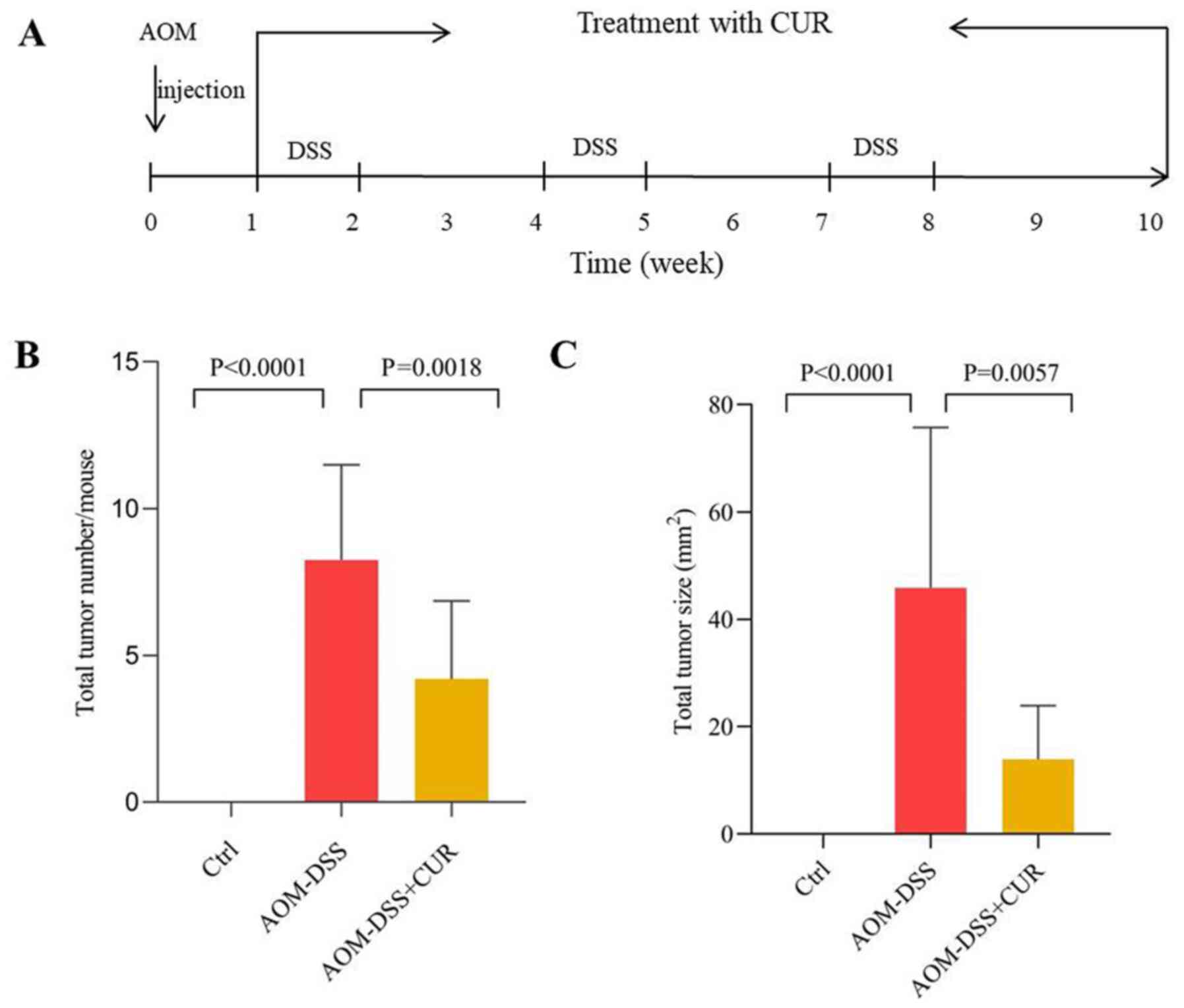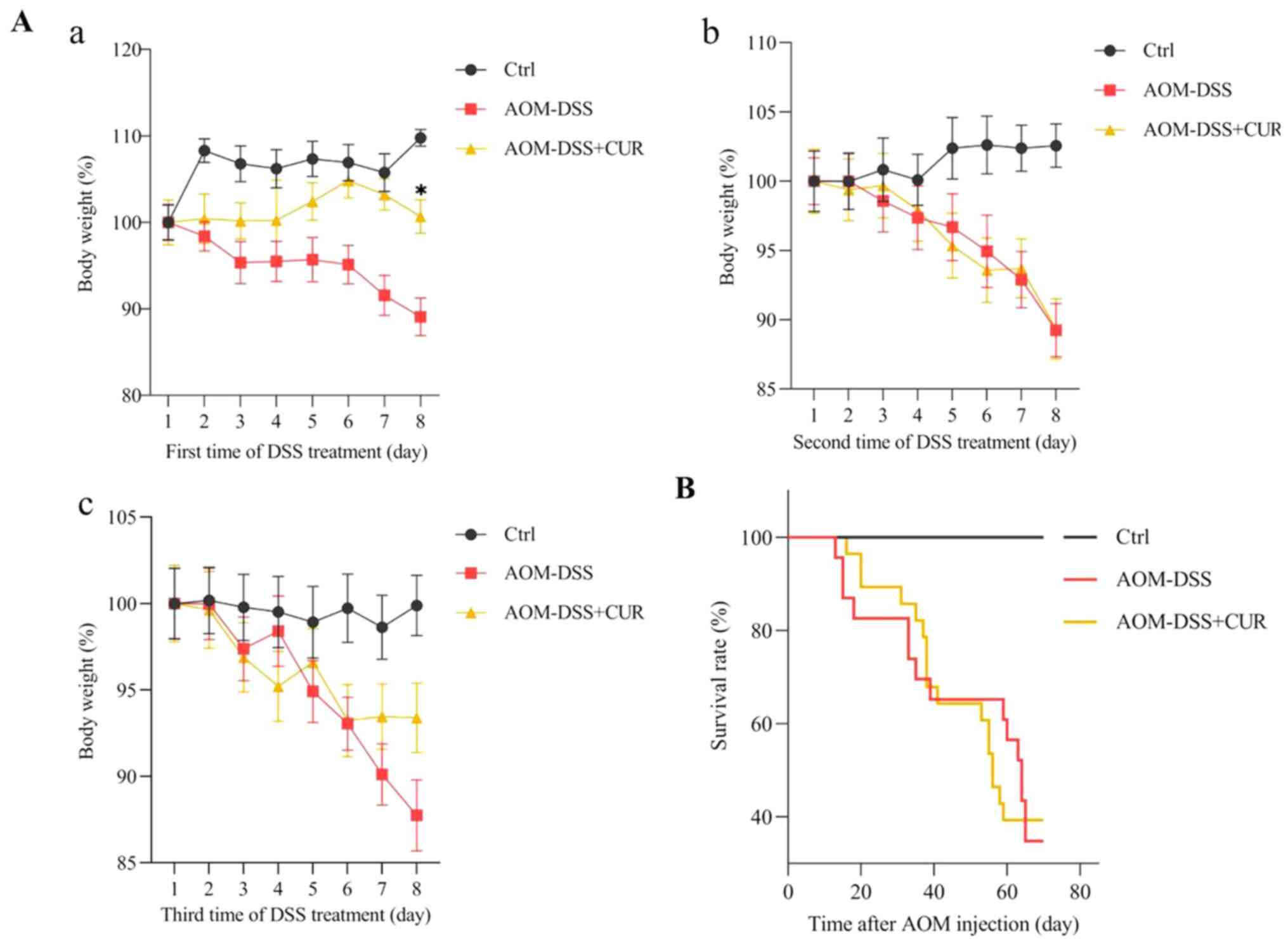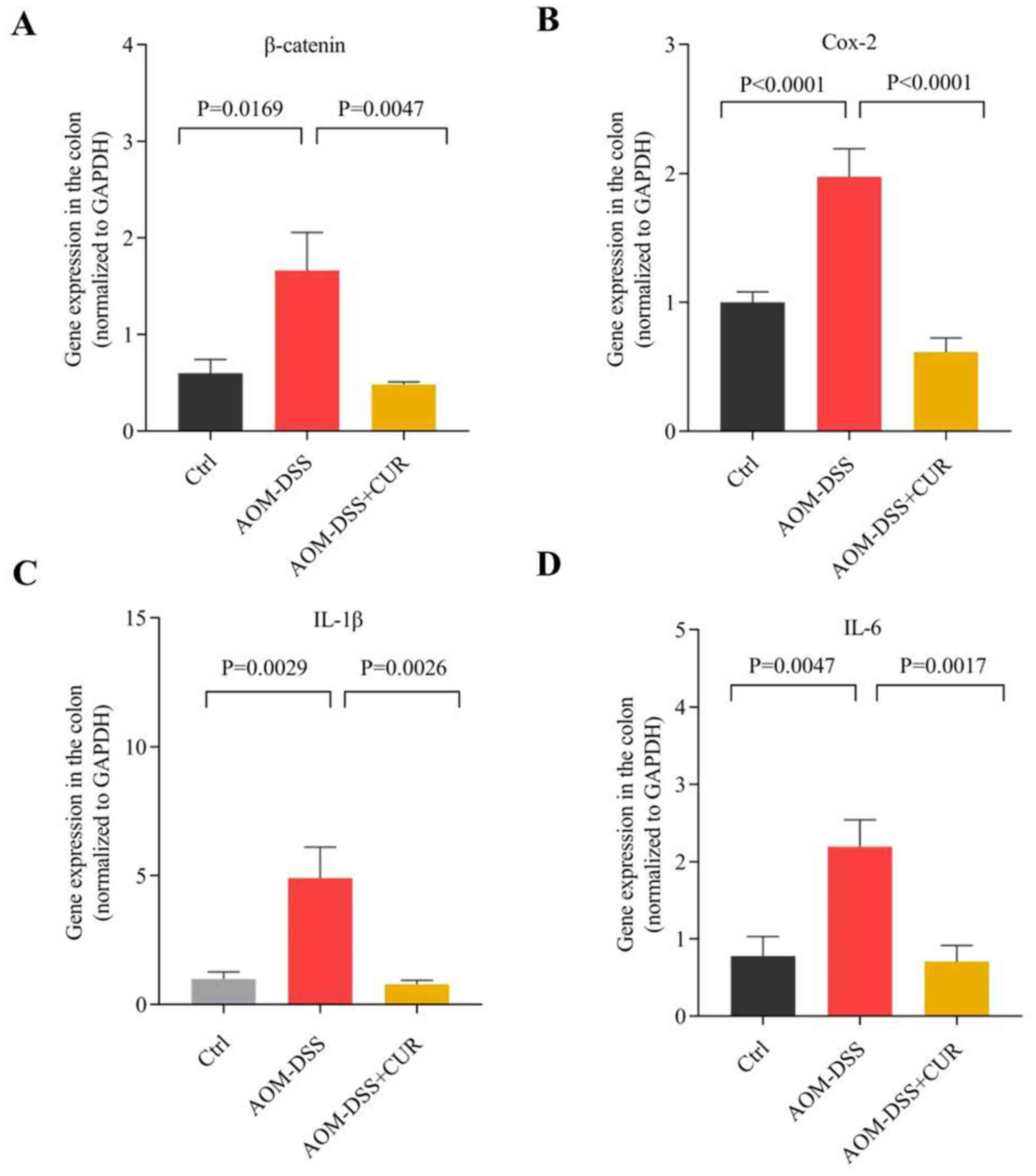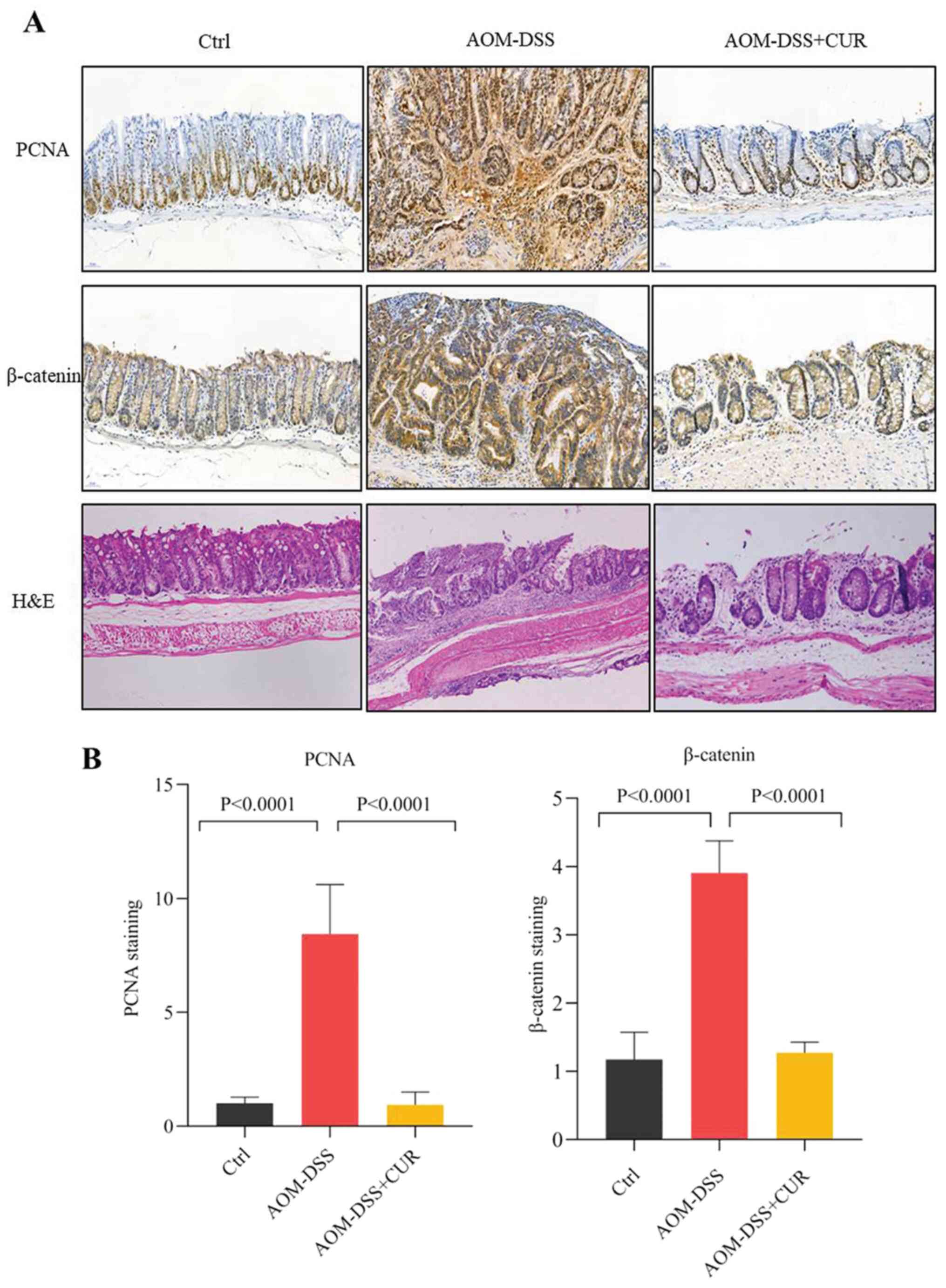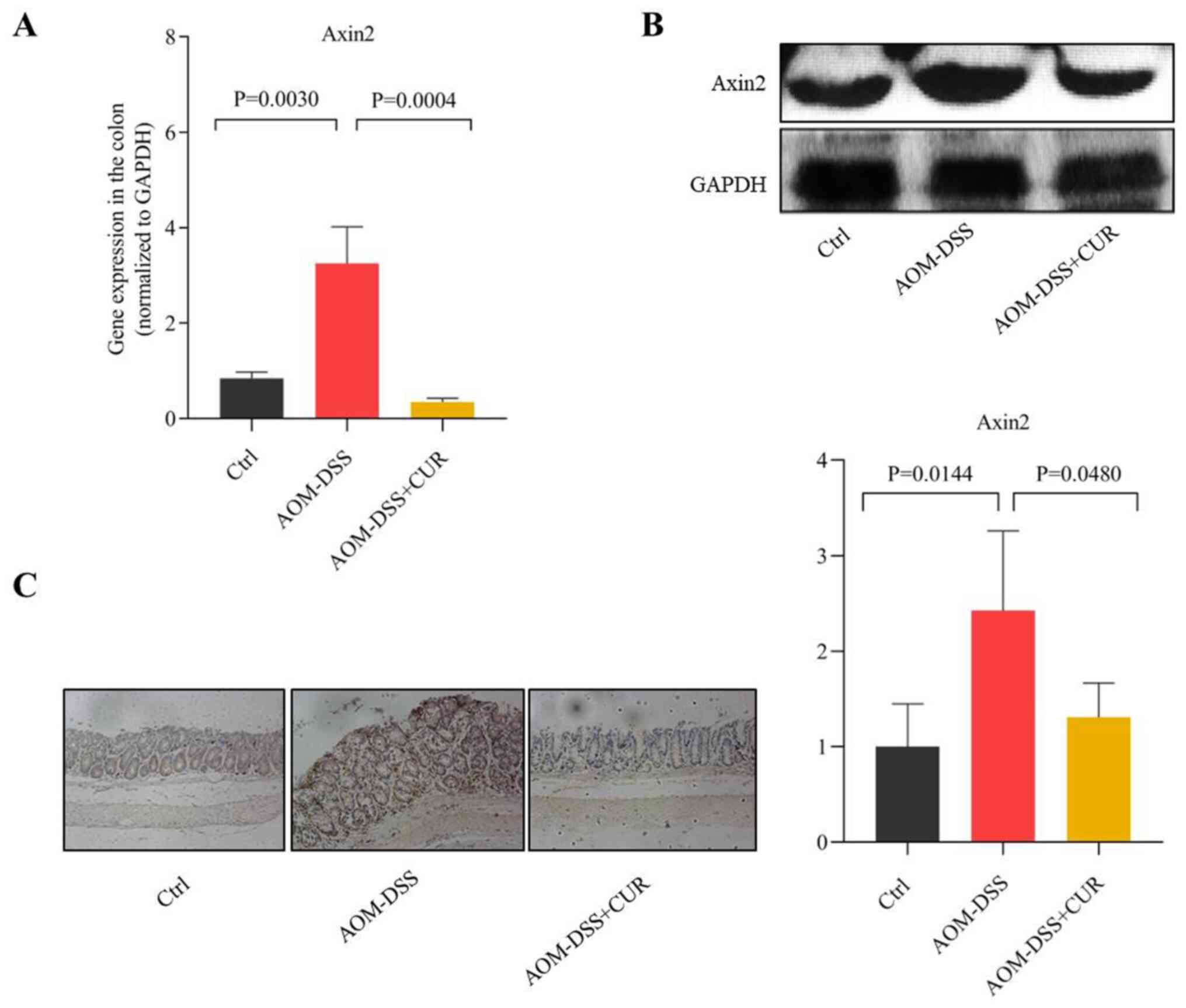|
1
|
Isnida IN, Iekhsan O, Faridah A, Nordin H
and Rakesh N: Mechanism of apoptosis induced by curcumin in
colorectal cancer. Int J Mol Sci. 20:24542019. View Article : Google Scholar
|
|
2
|
Bahrami A, Khazaei M, Hasanzadeh M,
ShahidSales S, Mashhad MJ, Farazestanian M, Sadeghnia HR, Rezayi M,
Maftouh M, Hassanian SM and Avan A: Therapeutic potential of
targeting PI3K/AKT pathway in treatment of colorectal cancer:
Rational and progress. J Cell Biochem. 119:2460–2469. 2018.
View Article : Google Scholar : PubMed/NCBI
|
|
3
|
Wong KE, Ngai SC, Chan KG, Lee LH, Goh BH
and Chuan LH: Curcumin nanoformulations for colorectal cancer: A
review. Front Pharmacol. 10:1522019. View Article : Google Scholar : PubMed/NCBI
|
|
4
|
Molodecky NA, Soon IS, Rabi DM, Ghali WA,
Ferris M, Chernoff G, Benchimol EI, Panaccione R, Ghosh S, Barkema
HW and Kaplan GG: Increasing incidence and prevalence of the
inflammatory bowel diseases with time, based on systematic review.
Gastroenterology. 142:46–54. 2012. View Article : Google Scholar : PubMed/NCBI
|
|
5
|
Goel A, Kunnumakkara AB and Aggarwal BB:
Curcumin as ‘Curecumin’: From kitchen to clinic. Biochem Pharmacol.
75:787–809. 2008. View Article : Google Scholar : PubMed/NCBI
|
|
6
|
Ahmad A, Sakr WA and Rahman KM: Novel
targets for detection of cancer and their modulation by
chemopreventive natural compounds. Front Biosci (Elite ED).
4:410–425. 2012. View
Article : Google Scholar : PubMed/NCBI
|
|
7
|
Nobili S, Lippi D, Witort E, Donnini M,
Bausi L, Mini E and Capaccioli S: Natural compounds for cancer
treatment and prevention. Pharmacol Res. 59:365–378. 2009.
View Article : Google Scholar : PubMed/NCBI
|
|
8
|
Srimal RC and Dhawan BN: Pharmacology of
diferuloyl methane (curcumin), a non-steroidal anti-inflammatory
agent. J Pharm Pharmacol. 25:447–452. 1973. View Article : Google Scholar : PubMed/NCBI
|
|
9
|
Sugiyama Y, Kawakishi S and Osawa T:
Involvement of the beta-diketone moiety in the antioxidative
mechanism of tetrahydrocurcumin. Biochem Pharmacol. 52:519–525.
1996. View Article : Google Scholar : PubMed/NCBI
|
|
10
|
Mahady GB, Pendland SL, Yun G and Lu ZZ:
Turmeric (Curcuma longa) and curcumin inhibit the growth of
helicobacter pylori, a group 1 carcinogen. Anticancer Res.
22:4179–4181. 2002.PubMed/NCBI
|
|
11
|
Kuttan R, Bhanumathy P, Nirmala K and
George MC: Potential anticancer activity of turmeric (curcuma
longa). Cancer Lett. 29:197–202. 1985. View Article : Google Scholar : PubMed/NCBI
|
|
12
|
Gupta SC, Patchva S and Aggarwal BB:
Therapeutic roles of curcumin: Lessons learned from clinical
trials. AAPS J. 15:195–218. 2013. View Article : Google Scholar : PubMed/NCBI
|
|
13
|
Hewlings SJ and Kalman DS: Curcumin: A
review of its' effects on human health. Foods. 6:922017. View Article : Google Scholar
|
|
14
|
Moradi-Marjaneh R, Hassanian SM,
Shahidsalea S, Avan A and Khazaei M: Curcumin effects on the wnt
signaling pathway in colorectal cancer stem cells. Basic Clin
Cancer Res. 10:33–48. 2018.
|
|
15
|
Srivastava NS and Srivastava RA: Curcumin
and quercetin synergistically inhibit cancer cell proliferation in
multiple cancer cells and modulate Wnt/β-catenin signaling and
apoptotic pathways in A375 cells. Phytomedicine. 52:117–128. 2019.
View Article : Google Scholar : PubMed/NCBI
|
|
16
|
Yan D, Wiesmann M, Rohan M, Chan V,
Jefferson AB, Guo L, Sakamoto D, Caothien RH, Fuller JH, Reinhard
C, et al: Elevated expression of axin2 and hnkd mRNA provides
evidence that Wnt/beta-catenin signaling is activated in human
colon tumors. Proc Natl Acad Sci USA. 98:14973–14978. 2001.
View Article : Google Scholar : PubMed/NCBI
|
|
17
|
Hai J, Fan Q, Yan W, Xu Y and Yan S:
Curcumin inhibits cell proliferation and induces apoptosis of human
non-small cell lung cancer cells through the upregulation of
miR-192-5p and suppression of PI3K/Akt signaling pathway. Oncol
Rep. 34:2782–2789. 2015. View Article : Google Scholar : PubMed/NCBI
|
|
18
|
Zhen L, Fan D, Yi X, Cao X, Chen D and
Wang L: Curcumin inhibits oral squamous cell carcinoma
proliferation and invasion via EGFR signaling pathways. Int J Clin
Exp Pathol. 7:6438–6446. 2014.PubMed/NCBI
|
|
19
|
Yu H, Xie Y, Zhou Z, Wu Z, Dai X and Xu B:
Curcumin regulates the progression of colorectal cancer via LncRNA
NBR2/AMPK pathway. Technol Cancer Res Treat.
18:15330338198707812019. View Article : Google Scholar : PubMed/NCBI
|
|
20
|
Shakibaei M, Mobasheri A, Lueders C, Busch
F, Shayan P and Goel A: Curcumin enhances the effect of
chemotherapy against colorectal cancer cells by inhibition of NF-κB
and src protein kinase signaling pathways. PLoS One. 8:e572182013.
View Article : Google Scholar : PubMed/NCBI
|
|
21
|
Hawkins P, Prescott MJ, Carbone L,
Dennison N, Johnson C, Makowska IJ, Marquardt N, Readman G, Weary
DM and Golledge HD: A good death? Report of the second newcastle
meeting on laboratory animal euthanasia. Animals (Basel). 9:502016.
View Article : Google Scholar
|
|
22
|
Livak KJ and Schmittgen TD: Analysis of
relative gene expression data using real-time quantitative PCR and
the 2(-Delta Delta C(T)) method. Methods. 25:402–408. 2001.
View Article : Google Scholar : PubMed/NCBI
|
|
23
|
Guo Y, Liu Y, Zhang C, Su ZY, Li W, Huang
MT and Kong AN: The epigenetic effects of aspirin: The modification
of histone H3 lysine 27 acetylation in the prevention of colon
carcinogenesis in azoxymethane- and dextran sulfate sodium-treated
CF-1 mice. Carcinogenesis. 37:616–624. 2016. View Article : Google Scholar : PubMed/NCBI
|
|
24
|
Jones CP, Boyd KL and Wallace JM:
Evaluation of mice undergoing serial oral gavage while awake or
anesthetized. J Am Assoc Lab Anim Sci. 6:805–810. 2016.
|
|
25
|
Salahshor S, Goncalves J, Chetty R,
Gallinger S and Woodgett JR: Differential gene expression profile
reveals deregulation of pregnancy specific beta1 glycoprotein 9
early during colorectal carcinogenesis. BMC Cancer. 5:662005.
View Article : Google Scholar : PubMed/NCBI
|
|
26
|
Gunes EG, Pinarbasi E and Pinarbasi H:
AXIN2 polymorphism and its association with astrocytoma in a
turkish population. Mol Med Rep. 3:705–709. 2010.PubMed/NCBI
|
|
27
|
Kanzaki H, Ouchida M, Hanafusa H, Yano M,
Suzuki H, Aoe M, Imai K, Shimizu N, Nakachi K and Shimizu K: Single
nucleotide polymorphism of the AXIN2 gene is preferentially
associated with human lung cancer risk in a Japanese population.
Int J Mol Med. 18:279–284. 2006.PubMed/NCBI
|
|
28
|
Aristizabal-Pachon AF, Carvalho TI,
Carrara HH, Andrade J and Takahashi CS: AXIN2 polymorphisms, the
β-Catenin destruction complex expression profile and breast cancer
susceptibility. Asian Pac J Cancer Prev. 16:7277–7284. 2015.
View Article : Google Scholar : PubMed/NCBI
|
|
29
|
Yallapu MM, Jaggi M and Chauhan SC:
Curcumin nanomedicine: A road to cancer therapeutics. Curr Pharm
Des. 19:1994–2010. 2013. View Article : Google Scholar : PubMed/NCBI
|
|
30
|
Sanidad KZ, Zhu J, Wang W, Du Z and Zhang
G: Effects of stable degradation products of curcumin on cancer
cell proliferation and inflammation. J Agric Food Chem.
4:9189–9195. 2016. View Article : Google Scholar
|
|
31
|
Gordon ON, Luis PB, Sintim HO and
Schneider C: Unraveling curcumin degradation: Autoxidation proceeds
through spiroepoxide and vinylether intermediates enroute to the
main bicyclopentadione. J Biol Chem. 290:4817–4828. 2015.
View Article : Google Scholar : PubMed/NCBI
|
|
32
|
Griesser M, Pistis V, Suzuki T, Tejera N,
Pratt DA and Schneider C: Autoxidative and cyclooxygenase-2
catalyzed transformation of the dietary chemopreventive agent
curcumin. J Biol Chem. 286:1114–1124. 2011. View Article : Google Scholar : PubMed/NCBI
|
|
33
|
De Robertis M, Massi E, Poeta ML, Carotti
S, Morini S, Cecchetelli L, Signori E and Fazio VM: The AOM/DSS
murine model for the study of colon carcinogenesis: From pathways
to diagnosis and therapy studies. J Carcinog. 10:92011. View Article : Google Scholar : PubMed/NCBI
|
|
34
|
Guo H, Xu YM, Ye ZQ, Yu JH and Hu XY:
Curcumin induces cell cycle arrest and apoptosis of prostate cancer
cells by regulating the expression of IkappaBalpha, c-jun and
androgen receptor. Pharmazie. 68:431–434. 2013.PubMed/NCBI
|
|
35
|
Ma J, Fang B, Zeng F, Pang H, Zhang J, Shi
Y, Wu X, Cheng L, Ma C, Xia J and Wang Z: Curcumin inhibits cell
growth and invasion through up-regulation of miR-7 in pancreatic
cancer cells. Toxicol Lett. 231:82–91. 2014. View Article : Google Scholar : PubMed/NCBI
|
|
36
|
Dou H, Shen R, Tao J, Huang L, Shi H, Chen
H, Wang Y and Wang T: Curcumin suppresses the colon cancer
proliferation by inhibiting wnt/β-catenin pathways via miR-130a.
Front Pharmacol. 8:8772017. View Article : Google Scholar : PubMed/NCBI
|
|
37
|
Lv ZD, Liu XP, Zhao WJ, Dong Q, Li FN,
Wang HB and Kong B: Curcumin induces apoptosis in breast cancer
cells and inhibits tumor growth in vitro and in vivo. Int J Clin
Exp Pathol. 7:2818–2824. 2014.PubMed/NCBI
|
|
38
|
Hynes MJ, Huang KM and Huang EH: Review
paper: Implications of the ‘Cancer Stem Cell’ hypothesis on murine
models of colon cancer and colitis-associated cancer. Vet Pathol.
46:819–835. 2009. View Article : Google Scholar : PubMed/NCBI
|
|
39
|
Ryan BM, Wolff RK, Valeri N, Khan M,
Robinson D, Paone A, Bowman ED, Lundgreen A, Caan B, Potter J, et
al: An analysis of genetic factors related to risk of inflammatory
bowel disease and colon cancer. Cancer Epidemiol. 38:583–590. 2014.
View Article : Google Scholar : PubMed/NCBI
|
|
40
|
Kahkhaie KR, Mirhosseini A, Aliabadi A,
Mohammadi A, Mousavi MJ, Haftcheshmeh SM, Sathyapalan T and
Sahebkar A: Curcumin: A modulator of inflammatory signaling
pathways in the immune system. Inflammopharmacology. 27:885–900.
2019. View Article : Google Scholar : PubMed/NCBI
|
|
41
|
Chen M, Hu DN, Pan Z, Lu CW, Xue CY and
Aass L: Curcumin protects against hyperosmoticity-induced Il-1beta
elevation in human corneal epithelial cell via MAPK pathways. Exp
Eye Res. 90:437–443. 2010. View Article : Google Scholar : PubMed/NCBI
|
|
42
|
Morin PJ, Sparks AB, Korinek V, Barker N,
Clevers H, Vogelstein B and Kinzler KW: Activation of
beta-catenin-tcf signaling in colon cancer by mutations in
beta-catenin or APC. Science. 275:1787–1790. 1997. View Article : Google Scholar : PubMed/NCBI
|
|
43
|
Korinek V, Barker N, Morin PJ, Wichen D,
de Weger R, Kinzler KW, Vogelstein B and Clevers H: Constitutive
transcriptional activation by a beta-catenin-tcf complex in
APC-/-colon carcinoma. Science. 275:1784–1787. 1997. View Article : Google Scholar : PubMed/NCBI
|
|
44
|
Park SH, Kang K, Giannopoulou E, Yu Q,
Kang K, Kim G, Park-Min KH and Ivashkiv LB: Type I interferons and
the cytokine TNF cooperatively reprogram the macrophage epigenome
to promote inflammatory activation. Nat Immunol. 10:1104–1116.
2017. View Article : Google Scholar
|
|
45
|
Wu Y, Liu Z, Wu W, Lin S, Zhang N, Wang H,
Tan S, Lin P, Chen X, Wu L and Xu J: Effects of FM0807, a novel
curcumin derivative, on lipopolysaccharide-induced inflammatory
factor release via the ROS/JNK/p53 pathway in RAW264.7 cells.
Biosci Rep. 5:BSR201808492018. View Article : Google Scholar
|
|
46
|
Mccubrey JA, Rakus D, Gizak A, Steelman
LS, Abrams SL, Lertpiriyapong K, Fitagerald TL, Yang LV, Montalto
G, Cervello M, et al: Effects of mutations in Wnt/β-catenin,
hedgehog, notch and PI3K pathways on GSK-3 activity-diverse effects
on cell growth, metabolism and cancer. Biochim Biophys Acta.
12:2942–2976. 2016. View Article : Google Scholar
|
|
47
|
Bahrami A, Amerizadeh F, Shahidsales S,
Khazaei M, Ghayour-Mobarhan M, Sadeghnia HR, Maftouh M, Hassanian
SM and Avan A: Therapeutic potential of targeting Wnt/β-catenin
pathway in treatment of colorectal cancer: Rational and progress. J
Cell Biochem. 118:1979–1983. 2017. View Article : Google Scholar : PubMed/NCBI
|
|
48
|
Jho E, Zhang T, Domon C, Joo CK, Freund JN
and Costantini F: Wnt/beta-catenin/Tcf signaling induces the
transcription of axin2, a negative regulator of the signaling
pathway. Mol Cell Biol. 22:1172–1183. 2002. View Article : Google Scholar : PubMed/NCBI
|
|
49
|
Chen HY, Lang YD, Lin HN, Liu YR, Liao CC,
Nana AW, Yen Y and Chen RH: MiR-103/107 prolong wnt/β-catenin
signaling and colorectal cancer stemness by targeting axin2. Sci
Rep. 9:96872019. View Article : Google Scholar : PubMed/NCBI
|
|
50
|
Liu C, Kato Y, Zhang Z, Do VM, Yankner BA
and He X: Beta-trcp couples beta-catenin
phosphorylation-degradation and regulates xenopus axis formation.
Proc Natl Acad Sci USA. 96:6273–6278. 1999. View Article : Google Scholar : PubMed/NCBI
|
|
51
|
He TC, Sparks AB, Rago C, Hermeking H,
Zawel L, da Costa LT, Morin PJ, Vogelstein B and Kinzler KW:
Identifcation of c-myc as a target of the APC pathway. Science.
281:1509–1512. 1998. View Article : Google Scholar : PubMed/NCBI
|
|
52
|
Jubb AM, Chalasani S, Frantz GD, Smits R,
Grabsch HI, Kavi V, Maughan NJ, Hillan KJ, Quirke P and Koeppen H:
Achaete-Scute like 2 (ascl2) is a target of wnt signalling and is
upregulated in intestinal neoplasia. Oncogene. 25:3445–3457. 2006.
View Article : Google Scholar : PubMed/NCBI
|
|
53
|
Lustig B, Jerchow B, Sachs M, Weiler S,
Pietsch T, Karsten U, van de Wetering M, Clevers H, Schlag PM,
Birchmeier W and Behrens J: Negative feedback loop of wnt signaling
through upregulation of conductin/axin2 in colorectal and liver
tumors. Mol Cell Biol. 22:1184–1193. 2002. View Article : Google Scholar : PubMed/NCBI
|
|
54
|
Wu ZQ, Brabletz T, Fearon E, Willis AL, Hu
CY, Li XY and Weiss SJ: Canonical wnt suppressor, axin2, promotes
colon carcinoma oncogenic activity. Proc Natl Acad Sci USA.
109:11312–11317. 2012. View Article : Google Scholar : PubMed/NCBI
|
|
55
|
Sokolosky ML, Stadelman KM, Chappell WH,
Abrams SL, Martelli AM, Stivala F, Libra M, Nicoletti F, Drobot LB,
Franklin RA, et al: Involvement of akt-1 and mTOR in sensitivity of
breast cancer to targeted therapy. Oncotarget. 2:538–550. 2011.
View Article : Google Scholar : PubMed/NCBI
|
|
56
|
Zhao G, Han X, Zheng S, Li Z, Sha Y, Ni J,
Sun Z, Qiao S and Song Z: Curcumin induces autophagy, inhibits
proliferation and invasion by downregulating AKT/mTOR signaling
pathway in human melanoma cells. Oncol Rep. 35:1065–1074. 2016.
View Article : Google Scholar : PubMed/NCBI
|
|
57
|
Zhu FQ, Chen MJ, Zhu M, Zhao RS, Qiu W, Xu
X, Liu H, Zhao HW, Yu RJ, Wu XF, et al: Curcumin suppresses
epithelial-mesenchymal transition of renal tubular epithelial cells
through the inhibition of Akt/mTOR pathway. Biol Pharm Bull.
40:17–24. 2017. View Article : Google Scholar : PubMed/NCBI
|
|
58
|
Yun JH, Park YG, Lee KM, Kim J and Nho CW:
Curcumin induces apoptotic cell death via oct4 inhibition and
GSK-3β activation in NCCIT cells. Mol Nutr Food Res. 59:1053–1062.
2015. View Article : Google Scholar : PubMed/NCBI
|
|
59
|
Marin YE, Wall BA, Wang S, Namkoong J,
Martino JJ, Suh J, Lee HJ, Rabson AB, Yang CS, Chen S and Ryu JH:
Curcumin downregulates the constitutive activity of NF-κB and
induces apoptosis in novel mouse melanoma cells. Melanoma Res.
17:274–283. 2007. View Article : Google Scholar : PubMed/NCBI
|
|
60
|
Marjaneh RM, Rahmani F, Hassanian SM,
Rezaei N, Hashemzehi M, Bahrami A, Ariakia F, Fiuji H, Sahebkar A,
Avan A and Khazaei M: Phytosomal curcumin inhibits tumor growth in
colitis-associated colorectal cancer. J Cell Physiol.
233:6785–6798. 2018. View Article : Google Scholar : PubMed/NCBI
|
|
61
|
Aoki H, Takada Y, Kondo S, Sawaya R,
Aggarwal BB and Kondo Y: Evidence that curcumin suppresses the
growth of malignant gliomas in vitro and in vivo through induction
of autophagy: Role of Akt and extracellular signal-regulated kinase
signaling pathways. Mol Pharmacol. 72:29–39. 2007. View Article : Google Scholar : PubMed/NCBI
|















